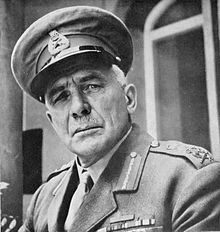The Lord Ironside | |
|---|---|
 General Sir Edmund Ironside in c. 1940 | |
| Birth name | William Edmund Ironside |
| Nickname(s) | "Tiny" |
| Born | 6 May 1880 Edinburgh, Scotland |
| Died | 22 September 1959 (aged 79) Queen Alexandra Military Hospital, London |
| Allegiance | United Kingdom |
| Service | British Army |
| Years of service | 1899–1940 |
| Rank | Field Marshal |
| Unit | Royal Field Artillery Royal Artillery |
| Commands |
|
| Battles / wars | |
| Awards |
|
Field Marshal William Edmund Ironside, 1st Baron Ironside, GCB, CMG, DSO (6 May 1880 – 22 September 1959) was a senior officer of the British Army who served as Chief of the Imperial General Staff during the first year of the Second World War.
Ironside joined the Royal Artillery in 1899, and served throughout the Second Boer War. This was followed by a brief period spying on the German colonial forces in South-West Africa. Returning to regular duty, he served on the staff of the 6th Infantry Division during the first two years of the First World War, before being appointed to a position on the staff of the newly raised 4th Canadian Division in 1916. In 1918, he was given command of a brigade on the Western Front. In 1919, he was promoted to command the Allied intervention force in northern Russia. Ironside was then assigned to an Allied force occupying Turkey, and then to the British forces based in Persia in 1921. He was offered the post of the commander of British forces in Iraq, but was unable to take up the role due to injuries in a flying accident.
He returned to the Army as Commandant of the Staff College, Camberley, where he advocated the ideas of a close friend, J. F. C. Fuller, who was a proponent of mechanisation. He later commanded a division, and military districts in both Britain and India, but his youth and his blunt approach limited his career prospects, and after being passed over for the role of Chief of the Imperial General Staff (CIGS) in 1937 he became Governor of Gibraltar, a traditional staging post to retirement. He was recalled from "exile" in mid-1939, being appointed as Inspector-General of Overseas Forces, a role which led most observers to expect he would be given the command of the British Expeditionary Force (BEF) on the outbreak of war.
However, after some political manoeuvring, General Gort was given this command and Ironside was appointed as the new Chief of the Imperial General Staff. Ironside himself believed that he was temperamentally unsuited to the job, but felt obliged to accept it. In early 1940 he argued heavily for Allied intervention in Scandinavia, but this plan was shelved at the last minute when the Finnish-Soviet Winter War ended. During the invasion of Norway and the Battle of France he played little part; his involvement in the latter was limited by a breakdown in relations between him and Gort. He was replaced as CIGS at the end of May, and given a role to which he was more suited: Commander-in-Chief Home Forces, responsible for anti-invasion defences and for commanding the Army in the event of German landings. However, he served less than two months in this role before being replaced. After this, Ironside was promoted to Field Marshal and raised to the peerage as Baron Ironside.
Lord Ironside retired to Morley Old Hall in Norfolk to write, and never again saw active service or held any official position.
Shortly before being dismissed in 1940, Ironside had been named as a future military dictator for a potential fascist coup against Britain intended to take place when Germany landed in Britain. While neither his involvement nor even his knowledge of the plot were ever conclusively proven, J.F.C. Fuller, a confirmed conspirator, told another conspirator that "Ironside is with us."[1]
- ^ Tate, Tim (25 April 2019). "Treason, Treachery and Pro-Nazi Activities by the British Ruling Classes During World War Two". CRWS Working Papers: 19–25.